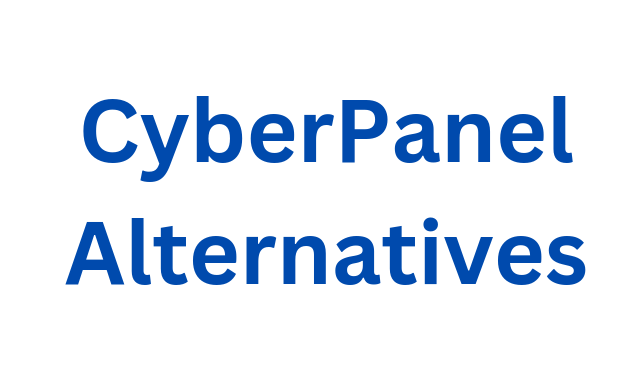To find out more about the CyberPanel alternatives that are open source, see this article. At Bobcares, we assist our customers with several CyberPanel queries on a daily basis as part of our CyberPanel Support Services.
Overview
- An Introduction to cPanel Alternatives
- 1. Webmin
- 2. ISPConfig
- 3. Virtualmin
- 4. RunCloud
- 5. AaPanel
- Conclusion
An Introduction to CyberPanel Alternatives
CyberPanel is a web hosting control panel designed to manage and ease the hosting of websites, emails, and databases on a server. Although CyberPanel has a lot of capabilities, especially since it integrates with LiteSpeed Web Server, customers may want to explore for alternatives for a variety of reasons, such as specific user requirements, ease of use and user interface, and more. In the following section, we’ll see some of the main alternatives we can use.

1. Webmin
The most widely used free and open-source alternative for CyberPanel is called Webmin. It is a web-based system configuration tool that facilitates administering Unix-like systems by allowing us to simply configure numerous operating system internals, such as: Users, Disk quotas, Services, Configuration files. Without the need to use command-line tools or manually edit configuration files, Webmin’s user-friendly web-based interface makes it easy to access and adjust these essential system components.
Because of this, Webmin is the best option for system administrators who want to administer their Unix-based workstations and servers in an effective and user-friendly manner.
2. ISPConfig
Under the BSD license, ISPConfig is an open source hosting control panel for Linux. It is a flexible and effective option for system administrators and hosting companies since it can handle numerous servers from a single control panel. Here are some ideas for ISPConfig features:
1. Extensions & Plugins: These enable users to quickly add new features and modify ISPConfig to meet their unique requirements.
2. Ad-free: Having a clear, uncluttered user interface free of intrusive adverts.
3. Automatic Backup: Setting up a reliable backup system with schedule, storage, and backup type choices to safeguard user data and configurations.
4. Website Monitoring: Website monitoring is the process of integrating an extensive tracking system to monitor the performance, security, and uptime of a website. Alerts and reports are then generated for proactive management.
5. Better User UI: Improving the whole user experience with a contemporary, easily navigable, responsive, and intuitive UI.
6. Enhanced Security Features: To defend against assaults and unauthorised access, additional security methods including intrusion detection, SSL/TLS support, and two-factor authentication are implemented.
7. Scalability and High Availability : High availability and scalability refer to ISPConfig’s capacity to manage massive deployments and offer failover techniques for continuous service.
3. Virtualmin
Virtualmin is a robust and adaptable web hosting control panel designed for BSD and Linux platforms. There are two versions available: an open-source version backed by the community and a feature-rich Pro version with paid support. Because of its extensive feature set and affordability, Virtualmin is a well-liked option for managing virtual web hosting.
It is a great option for managing web hosting settings because of its adaptability, simplicity, effectiveness, extensibility, and expert assistance.
4. RunCloud
A strong substitute for CyberPanel is RunCloud, which provides a SaaS-based web hosting panel designed specifically for administering PHP-based programs like WordPress and related systems. Users may effectively manage their websites with RunCloud without needing to have much server-level knowledge. RunCloud’s primary features include:
Atomic Git Deployment
Support for Multiple PHP Versions
Automated Backups
Server Health Monitoring
WordPress Deployment
One-Click SSL Integration
File Manager
Cron Job Management
WordPress Site Staging
Server Load Reports
Command-Line Interface (CLI) Version
5. AaPanel
An easy-to-use, feature-rich, and free hosting control panel called AaPanel was created to make managing web servers easier. With an emphasis on security and a user-friendly graphical user interface, AaPanel provides users with a smooth experience. As the best free substitute for CyberPanel, it is compatible with CentOS, Debian, and Ubuntu and offers web server control via a web-based graphical user interface.
Furthermore, users of CyberPanel have a dependable backup option in AaPanel.
The main features include:
Database Management
File Manager
Resource Monitoring
Website Management
FTP Support
Powerful Online Editor
Simplified management of Python projects using the online aaPanel editor
[Looking for a solution to another query? We are just a click away.]
Conclusion
Strong substitutes for CyberPanel include Webmin, ISPConfig, Virtualmin, RunCloud, and AaPanel, each with special capabilities catered to various need. These options offer complete solutions for efficiently managing servers and web hosting settings, regardless of the needs—open-source flexibility, improved security, usability, or sophisticated management tools.
To sum up, our Support Team went over the CyberPanel Alternatives details.




0 Comments